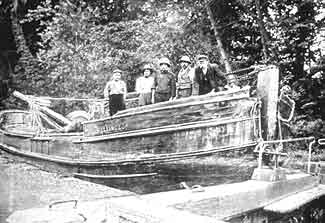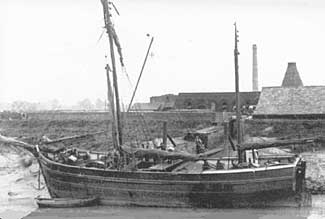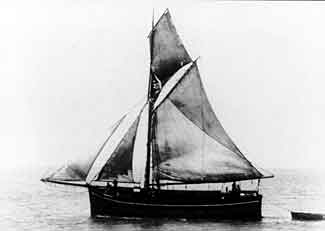Early Days
After leaving
school, James Herbert joined the crew of one of the numerous small
sailing vessels then trading around the Severn Estuary and Bristol
Channel. He evidently made a good impression, as in 1872 (at the
age of only 22) he became master of the barge Ready Penny,
owned by Framilode coal merchant Richard Williams. He soon moved
on to the larger Nelly and then the Maria, both also
owned by Richard Williams. These two barges regularly carried about
60 tons of Forest of Dean coal from Lydney to wharves along the
Stroudwater and Thames & Severn Canals.
 Coal to Stroud Gas Works Coal to Stroud Gas Works
In 1876, James Herbert took on a new role as master of the barge
Reliance, owned by the Stroud Gas Light & Coke Co and
pictured right on the Stroudwater Canal. For the next 20 years he
averaged 40 trips a year to Newport to collect 65 to 70 tons of
coal and bring it back to the gas works. During this time, he lived
at Framilode and then Whitminster, and he and his family were also
involved in farming.
First Vessel
James Herbert evidently prospered with
his busy life, and in 1891 he was able to purchase his first vessel.
The barge John of 72 tons register, with successive local
men as master, traded across the Bristol Channel, sailing between
Newport, Bristol, Cardiff and Weston super Mare. Two years later
James purchased the barge Volunteer, and with his eldest
son Benjamin as master, this carried Forest coal from the railway
tip at Sharpness to Stroud gas works. Three years later Volunteer
was replaced by the barge Wherry Packet, which continued
the same traffic. During this period, James's younger brother Charles
was also afloat, as master of barges owned by the Field family carrying
coal from Bullo Pill to wharves along the Stroudwater Canal.
Owner/Master
After 20 years of routine shuttle between
Newport and Stroud gas works, in 1897 James Herbert arranged for
Benjamin to replace him as master of the Reliance, leaving
James himself free to become master of his own barge John.
As befitting an owner/master, he also moved into the newly-built
Kimberley House close to Fretherne Bridge. Unfortunately, his new
life proved more exciting than had he would have wished. In the
following March, the barge experienced heavy weather while sailing
from Barry to Newport and foundered near the island of Flat Holm.
The crew, who included James's third son Arthur, had to take to
the boat - they were later rescued by another vessel and landed
at Weston.
 More Family Involvement More Family Involvement
James Herbert replaced the John with the smaller trow Victory,
37 tons register, and this he used to trade between Newport, Bristol,
Chepstow and Bridgwater. On some of these trips, he was accompanied
by one or more of his younger sons, Arthur, John and James jnr,
until he handed over command to his son-in-law William Halling in
1910. By this time, he had also purchased vessels for other members
of his family. His son Joseph became master of the Bridgwater registered
ketch Two Brothers (pictured right at Bridgwater), his son
William became master of the barge Perseverance, trading
between Bristol, Lydney, Chepstow and Newport, and the Wherry
Packet was replaced by the Endeavour taking coal from
the Sharpness tip to Stroud gas works. Meanwhile his eldest son
Benjamin continued as master of the Reliance, still taking
coal from Newport to Stroud gas works.
Cadbury's Factory
The Herbert family's long association
with Stroud gas works was about to come to an end, however, as the
opening of Cadbury's factory near Fretherne Bridge in 1916 created
another customer needing a regular supply of coal. Benjamin Herbert
relinquished his command of the Reliance, the Endeavour
ceased carrying to Stroud Gas Works and instead the family began
supplying Cadbury's with coal brought from the Sharpness tip. To
help with this traffic, James Herbert bought the former Severn &
Canal Carrying Co barge William in 1915, although four years
later this was replaced by the smack Industry which was fitted
with a motor. Cadbury's factory was partly built on land sold by
James Herbert, and as his house became the home of the factory manager,
he moved to Cambridge near Slimbridge and later to Oatfield between
Frampton and Whitminster.
Final Years
By the 1920s, the days of commercial sail
were coming towards their end, but although over seventy, James
Herbert was determined to keep the old traditions going as long
as possible. He bought the Reliance after she ceased carrying
coal to Stroud gas works in 1920, and he bought the Bridgwater ketches
Marian and Champion - the latter being an appropriate
name for an owner who was a champion of coastal sailing vessels
until he died in 1930. By this time, it was very difficult to keep
such vessels trading profitably in competition with motor barges,
and it was not long before most of James Herbert's fleet were converted
to towed barges or were broken up. Members of his family continued
with their lives afloat, but they had to come to terms with the
new mode of propulsion.
Sources: Mercantile Navy Lists; Crew Lists Glos RO D3080; Stroudwater
Canal tonnage books Glos RO D1180; Census records; Loss of the John
GJ 26 Mar 1898. Thanks to Nigel Harris and Paul Barnett. Photos:
Nigel Harris and Fred Rowbotham Archive. |

 Coal to Stroud Gas Works
Coal to Stroud Gas Works More Family Involvement
More Family Involvement